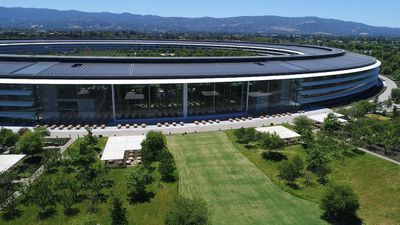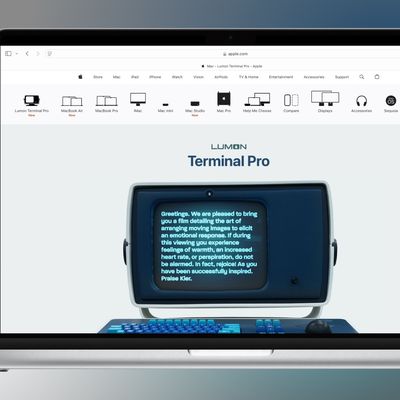Apple Considering Vaccination Requirement for Employees Returning to Offices
Apple has not decided whether or not it will require vaccines for corporate employees that return to work this October, according to CNBC's Josh Lipton.

Cook reportedly told Lipton that Apple is primarily focusing on when to have employees return, but the company is "monitoring things daily" to determine whether a vaccination requirement "is the right answer or not."
Google
today announced that it is requiring all employees who return to the company's offices to be vaccinated, and it's possible that Apple and other tech companies will also make that decision in an effort to protect employees.
Google has more than 130,000 employees, and the vaccination requirement pertains to anyone who comes into one of Google's offices. Like Apple, Google has delayed a return to work until mid-October.
Apple initially planned to have employees return to work for three days a week starting in September, but earlier this month, the company announced that it would not ask employees to return until "at least October."
Apple and Google have delayed office returns due to the prevalence of the Delta variant, which is more transmissible than original COVID-19 strains and has led to surging infection rates across the United States.
When employees are required to return to Apple campuses, Apple says it will give at least a month's notice.
Apple's return to work plan has been unpopular with some employees who have grown accustomed to working remotely and who have discovered that much of their jobs can be done from home. Many tech companies plan to allow employees to continue to work remotely on a permanent basis, but Apple is eager to get employees back to the office and has argued that in-person collaboration is essential to its culture and to future product development.
Popular Stories
While the iPhone 17 Pro and iPhone 17 Pro Max are not expected to launch until September, there are already plenty of rumors about the devices.
Below, we recap key changes rumored for the iPhone 17 Pro models as of March 2025:
Aluminum frame: iPhone 17 Pro models are rumored to have an aluminum frame, whereas the iPhone 15 Pro and iPhone 16 Pro models have a titanium frame, and the iPhone ...
Apple regularly refreshes the MacBook Pro models, and a new version that uses M5 series chips is in the works. Apple just finished refreshing most of the Mac lineup with M4 chips, and now it's time for the M5. Rumors suggest that we could see the first M5 MacBook Pro models this fall.
Design
There have been no rumors of a design update for the M5 MacBook Pro models that are coming this...
Apple is going all out with promotions for the popular Severance Apple TV+ show today, and as of right now, you'll find a new "Lumon Terminal Pro" listed on Apple's Mac site.
The Lumon Terminal Pro is designed to look similar to the machines that Severance employees like Mark S. and Helly R. use for macrodata refinement. The Terminal features a blue keyboard, a small display with wide...
In the mid-to-late 2000s, Facebook was all about staying connected with friends and family. However, as the social media platform added new features and grew over time, that core experience began to get drowned out.
That changes starting now, according to Meta, which today introduced a new feature that will "bring back the joy" of classic Facebook.
Specifically, Meta has redesigned the...
Apple is expected to release iOS 18.4 to the general public as soon as next week, following more than a month of beta testing.
Apple's website says some iOS 18.4 features will be released in "early April," so the update should be out as early as Tuesday, April 1.
Apple this week seeded the iOS 18.4 Release Candidate, which is typically the final beta version, barring the discovery of any...
Update 7:25 pm: Based on comments from our forums, it appears the original Weibo post may have been mistranslated and "8K" actually refers to the high price of the device rather than 8K video recording capabilities. The iPhone 16 Pro currently starts at 7,999 yuan in China.
Our original article follows below.
Apple's forthcoming iPhone 17 Pro models are capable of shooting 8K video, up...
Last week, we covered a report claiming that Apple's book-style foldable iPhone (or "iPhone Fold," as we are provisionally calling it here) will use liquid metal hinges to improve durability and help minimize screen creasing. Today, a Chinese leaker provided more details on the properties of this hinge material that help to clarify why Apple chose it for its first foldable device.
According...
The upcoming iOS 18.4 update for the iPhone adds an Ambient Music feature to Control Center. Below, we take a closer look at how it works.
iOS 18.4 is currently in beta, so the Ambient Music feature is not widely available yet. The update will likely be released to the general public next week.
To use the feature on iOS 18.4, open Control Center and tap on the plus sign in the top-left...
The iOS 19 mockup images that leaker Jon Prosser shared today are not representative of the actual iOS 19 design, Bloomberg's Mark Gurman said on social media.
According to Gurman, the images that are "floating around" are based on "very old builds" or "vague descriptions," and are lacking key features. Gurman says that we can "expect more from Apple in June."
Gurman made the same comment ...























